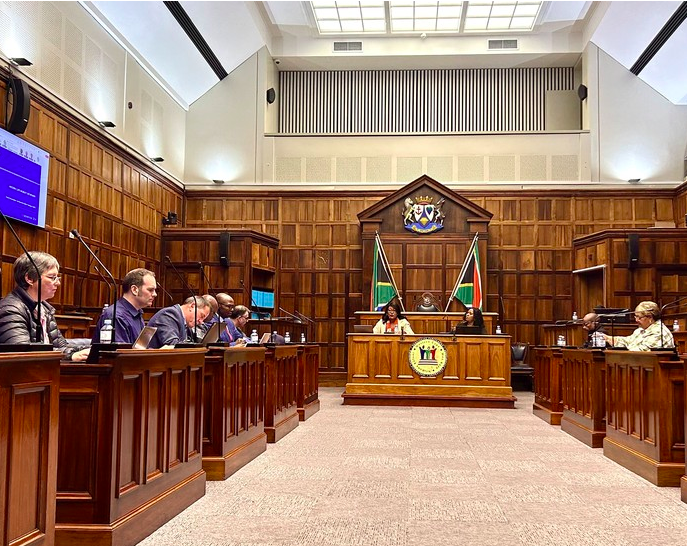Social workers are now being targeted by extortionists in vulnerable communities in Cape Town, the standing committee on social development in the provincial legislature heard on Friday. Photo: Matthew Hirsch
By Matthew Hirsch
- Social workers operating in vulnerable communities in Cape Town have become the latest targets for criminals demanding protection fees.
- In two incidents recently staff in Delft were threatened by extortionists, the Western Cape standing committee on social development heard on Friday.
- Wendy Kaizer-Philander, committee chairperson, said R20-million was spent on overtime to have two social workers work on a case in high-risk areas.
Social workers have become the latest target for criminal syndicates demanding cash “as a protection fee” in Cape Town.
“In Delft, they tell us if you want to go out (and) be safe, give us money,” Annemie van Reenen, chief director of service delivery, management and coordination in the Western Cape Department of Social Development, told the standing committee on social development at a briefing in the provincial legislature on Friday.
Officials from the City of Cape Town mobility department and the South African Police Service (SAPS) also attended.
Van Reenen said two recent incidents were reported by staff in Delft, where they were threatened by extortionists. This was a concern because the community had always protected social workers.
“They know we’ve got laptops and cellphones … It is terrible. I get messages [from social workers] to say they can’t cope anymore. Then we have to remove them to another area. They are hugely traumatised,” she said.
This inevitably has a negative knock-on impact in communities that rely on this essential service.
In August, GroundUp reported on the Province’s call for the justice department to implement harsher penalties for attacks on social workers after an “alarming increase” in attacks on social workers. The committee had asked the justice minister to classify attacks against social workers as an “offence against the state”, with harsher legal consequences. But there is yet to be a response.
Tsekiso Machike, justice ministry spokesperson, replied to GroundUp that the letter was received and the minister “is applying her mind” and “amenable to the idea of the meeting” with the Western Cape Social Development Committee.
“The Department is indeed concerned about the persistent attack against social workers or persons performing public function.”
Since 2019, 41 incidents were reported, including six robberies and assaults, and 35 hijackings and attempted hijackings. Most of these happened in a period of less than 18 months, according to the department.
Hotspot areas include Khayelitsha, Eerste River, Wynberg, Crossroads, Philippi, Mfuleni, Gugulethu, Delft, Mitchells Plain, Paarl East and Langa.
“We had people that were so severely traumatised that they were off for six months or more,” said Van Reenen. Urgent social worker cases had to be reallocated to social workers already dealing with heavy caseloads.
The department has implemented safety measures, such as removing government branding from cars, changing number plates, sending more than one staff member into hotspot areas at a time, and having regular meetings with community policing forums.
After the meeting, SAPS Provincial Commissioner Lieutenant General Thembisile Patekile told GroundUp, “It’s the first time that we hear that some government officials have been extorted. We must make sure we nip this thing in the bud.”
He urged people to use the Western Cape SAPS toll-free number 08 0031 4444 to report extortion.
On Monday, Wendy Kaizer-Philander (DA), chairperson of the social development committee, said in a statement that social workers already at risk of attacks and hijackings, now face the threat of extortionists as well.
“The R20-million spent on overtime to accommodate the need for two social workers per case in high-risk areas is straining the department’s resources. Doubling up on cases reduces the overall number of cases that can be handled, stretching the department’s already limited capacity,” said Kaizer-Philander.
Follow African Insider on Facebook, Twitter and Instagram
Picture: GroundUp
For more African news, visit Africaninsider.com


